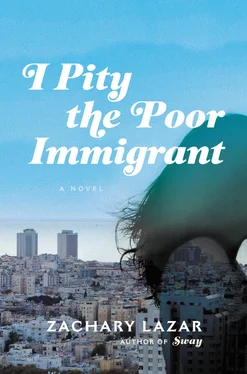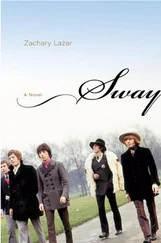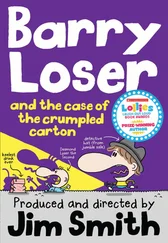A King David psalm:
… I am poured out like water,
And all my bones are out of joint;
My heart is like wax;
It is melted within me.
My strength is dried up like a potsherd;
And my tongue cleaves to my jaws;
And you lay me in the dust of death.

I went to see Gila’s friend Hugh that spring. I told him I’d found the building in Tel Aviv but that I’d never know for sure if Gila’s story was true or not. He showed me some more photographs — Gila at the beach, Gila at her house in Sag Harbor, Gila at a party for her birthday in a simple black dress and two strands of pearls. Her smile as she posed between Hugh and his partner, their heads brought close together to fit in the frame, was more vivacious than I would have imagined possible. An image began to emerge of Gila remade as an American, practically assimilated — more or less ordinary, more or less happy. I remembered something Rachel Kessler had told me in Jerusalem. Because the world is also like this: a glass of white wine on a nice day. Even for someone like Gila, even for someone like me. As a kind of parting gift, Hugh gave me something he’d taken as a keepsake from her house. It was a framed poster from the thirties, a black-and-white photo of the designer Elsa Schiaparelli, her name at the bottom, and at the top, in pink letters, the single word Shocking!
“Don’t take it if you don’t want it,” he said.
But of course I did take it. Like everything else, I included it in this book. I have it here now in the alcove in my apartment. Procrastinating, checking e-mail, I get a note from Voss that says, Skype me. Here for another hour. It’s one o’clock in the morning where he is, in his office in Jerusalem. We chat on our respective screens, his facial gestures split up somewhat like the panels in a comic strip, the picture frozen, then in motion again, then frozen. I sometimes wish I didn’t write about these subjects. I have told myself many times that I write about violence to understand it, not just out of morbid curiosity, but it can often seem like a fine distinction. It can seem like a distinction without a difference. I tell this to Voss and he says that the world we live in is more perverse than people like to think. He tells me about a recent murder in Ramat Gan in which the killers shot their victim in his own garage. He barked like a dog when they shot him, the killers said, and they were being literal. The victim’s wife, who was inside the house, came out to the garage because she’d heard a dog barking and she thought it was strange that there would be a dog in the garage because they didn’t own a dog.
“I’m just a journalist,” Voss says. “I’m not, what, a belletrist like you.”
“I don’t know what I am,” I say.
“You’re a voyeur. Like me. So what? There are worse things.”
His face is fixed on the screen again, then the screen goes gray, an entirely textureless blank. His disembodied voice tells me then that he’s considering coming to New York in a few months. It’s something we’ve talked about before. When we’ve talked about it, I’ve always realized that it would mean him staying for at least a week, probably closer to two. A round-trip ticket between Ben-Gurion and JFK is about fourteen hundred dollars with tax, a lot of money.
“We hardly know each other,” I say, still unable to see him clearly.
“I’d say we know each other in some ways,” his voice says.
“In some ways maybe.”
“I’m asking if you want me to come or not.”
His image reappears, moving once more in that stuttering way. I see his beard, the pupils of his eyes, the ring at the end of the zipper of his sweater. His face pulses in and out of clarity — stark, shadowed, volatile. There seems to be no answer in that moment other than to say yes. I tell him okay. His face is there and then not there, the light shifting as if I’m seeing him through flames.
13 The End TEL AVIV, 2008
One of the boys was tugging on the sleeve of Eliav’s jacket now, a different boy this time, his hair grown out in black curls that were almost like stubby dreadlocks. The standing water on the floor rose above the tops of their shoes. In front of them, a rectangle of yellowish light shone weakly on the far wall, cast there by a humming carousel slide projector that sat on a long card table at the room’s rear corner. It was dark except for that rectangle of light and the center of the room, where two floodlamps clipped to the ceiling pipes lit up a listless body seated in a chair, the bare bulbs burning a fierce white inside the opened corollas of their housings.
The body in the chair was Eliav’s father, Bellen. They had stripped him to his undershirt, his broken glasses strapped around his head with what appeared to be shoelaces. The sides of his father’s head were smeared dark with blood. Eliav had heard the screams from outside, a gun at his back, his face against the concrete fence. Seeing his father now, he found it impossible to stop looking. His father sat in the chair beneath the floodlights with an almost childlike inattention, the lenses of his broken glasses glinting in the bright light. They’d given Eliav the pistol by then, a Jericho 941, its dark grip textured in a grid pattern that had no temperature. He felt it in his hand, the smooth-rough surface of the metal. There was a thinness to his breathing, which caught in his throat like a little boy’s.
“I don’t know what he thought, that we were going to make it easy for him?” said the one in the denim jacket who was standing between Eliav and his father. He sniffed and shook his head, scratching his neck, the torn cuff of the jacket hanging from his forearm. He held a bandanna with which he’d been dabbing his sweat, and he let the rag drop now with a slow splash into the standing water.
“All those ideas of his, that’s why you’re here now. You’re here because he was asking for this — not this exactly, but you know what I mean. He wanted to be some kind of martyr. A martyr for what? Or maybe he just wanted to die. I don’t really know.”
He turned to Bellen then. “Look who’s here,” he said. “Does it make it easier to know that he’s here? That your son will remember all this, just like in the old prayers?”
His father looked scalded and pale beneath the bright lights, his hair glistening like a baby’s hair, his eyebrows almost transparent.
The boy looked back at Eliav then, fierce, his jacket twisted off his shoulder, boots splashing in the water. “Show some mercy, you piece of shit,” he said. “Don’t you think he’s a little ready for it to be over with?”
The water smelled like dead fish and gasoline. It was cold on Eliav’s feet, saturating his shoes. His father raised his chin just enough for the lenses of his glasses to stop reflecting the light of the floodlamps. It was impossible to see any movement or color in those eyes.
He felt the way his hand conformed to the pistol’s grip, the easy way his fingers fit around its contours. He felt the heft of the gun and the tension behind the trigger and the pressure of the metal against his skin. The boy in the denim jacket was still talking. He was looking down at the water, moving the heel of his boot gently over its surface. Eliav felt a sudden connection across the dark room, an intimate physical charge between himself and his father. He felt it as a tingling in his throat and his chest and he started sobbing.
Was the boy talking anymore? Were his father’s eyes even open?
Читать дальше













